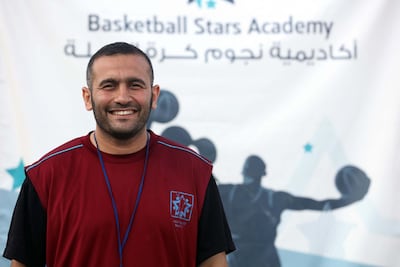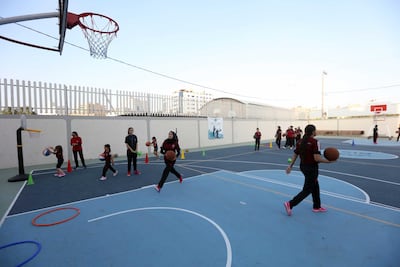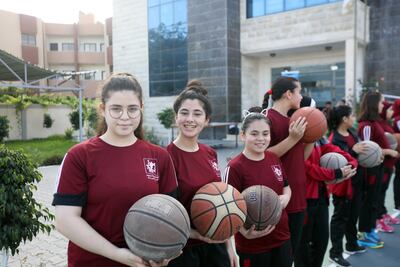When Haya Skaik, 16, arrives at Basketball Stars Academy each week in Gaza, she feels like she's with one big extended family. For an afternoon, she's surrounded by young girls like herself who simply love basketball and other sports.
Haya says that in Gaza, more girls than ever before are taking up sports such as basketball, football and tennis. "I feel the society in Gaza has begun to change and there is an opportunity for us girls to flourish in all aspects, such as sport, art and work."
Basketball Stars Academy
It's almost as if there isn't a conflict going on outside the walls of the school's compound. Basketball Stars Academy moved into its permanent home in March and is housed in the British International School in Gaza City. Its founder, Ibrahim Skaik – who isn't directly related to Haya – was a basketball player, once competing in tournaments with the Gaza Sports Club.
But in 2015, he chose to focus on the next generation, and young female players, in particular. "I decided to open this academy and send a message to the world that we can and we have the ability to be like anyone in the world, but we simply need the opportunity," he tells The National.
"The Palestinian girl is a persevering and creative girl with an ambition, and there is marginalisation of the Palestinian girl. So the decision was to focus on the girls, and we loved giving them a role in the field of sports, especially basketball."
It's been a long journey for Skaik. When he started to train girls, he would go from school to school, using any space he could to teach them the sport. But he always sought a permanent home for his fledgling idea. It wasn't until last year, when he approached the British International School, that he found a venue that would stick.
A roaring success
Skaik sent out an open call for girls to join his new academy and it's fair to say it's been popular. At the beginning of this year, 10 girls were involved with the academy, but within six months that rose to 105. Due to its roaring success, boys have also been recruited and there are now about 40 training at the academy.

Players meet three times a week for three-hour training sessions. Tournaments are organised through the academy, as well as schools. "But they are only local championships to motivate girls to compete," Skaik says. "We hope in the future to participate in Arab and international tournaments and I think we can; we have highly skilled girls."
Players between the ages of four and 20 take part in the sessions, and the boys train separately. It's not free to participate, but the 100 new Israeli shekel (Dh104) enrolment fee is not strictly enforced. Making a profit is not the goal of the academy and Skaik says some members pay less.
"Out of social solidarity there are trainees who do not have the ability to pay the subscription fee so we do not say no to anyone," he says. "We do not prevent anyone from playing basketball, everyone has the right to play."
__________
Read about another club providing relief for those in Gaza: Inside Palestine's new equestrian club
__________
There is no outside funding for organisers, either, and everything the academy spends must first be raised by donations or paid for out of their own pockets. The token contributions from players pay for coaches and administrators, and also go towards operational costs. "All of this is a personal effort," Skaik says. "The only capital share we have is our basketballs, which are collected from my personal money."
'The goal is to build a large family'
Skaik says he dreams of one day having a purpose-built headquarters for the academy, with a covered hall and perhaps a stadium built to international standards. He says he also wants the girls to be able to travel abroad to represent Palestine in the sport. But for now, he is focused on developing basketball in Gaza and maybe even bringing through a player or two who go on to play for Palestine. Skaik says he also hopes the academy will one day progress enough to provide him with a salary.

"Sometimes I wish that one day people will play basketball in the streets and alleys, as it happens in Europe," he says. "My colleagues and I are always in contact with the students participating in the academy and we try to build a friendship between us and them. For example, talking with them on a daily basis about life matters and giving them advice on their science studies, or their lives. The goal is to build a large family and not just a place to train."
That familial sentiment is echoed by Haya. "I joined the academy three months ago, having decided to join because I felt that basketball was different, especially because it wasn't available before for girls in Gaza, so I wanted to do something different. I got support from my parents.
"Since my first day at the academy I loved this sport and I loved the co-operation that is here. I feel that we are a family and I will work hard at the academy to become a good player."
Another student, Sarah Al Qurum, 12, has been training with Skaik and the group for the past six months. She says she looks forward to training each week as it helps her to improve her fitness, while the sessions are also a "good place to get positive energy".
"Participation in the academy means a lot to me," she says. "I meet new people every day and I engage in society and I do sports. I do what I love and this is the most important thing."















